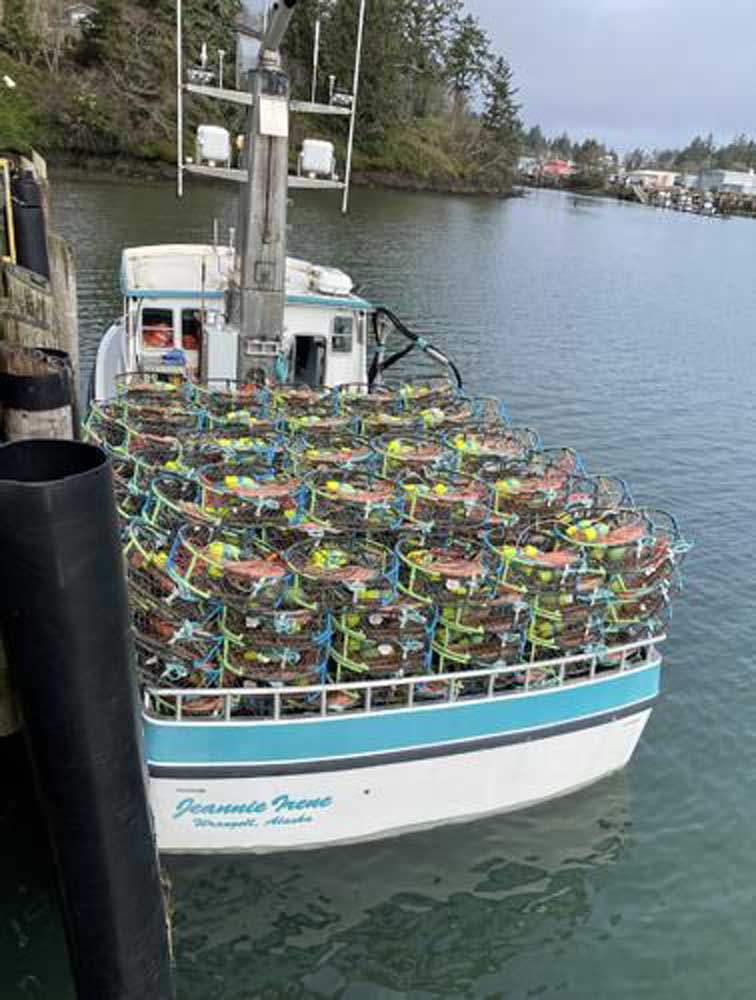Crabbers sue over GPS boat monitoring program
Published 11:29 pm Thursday, November 21, 2024

- The Jeannie Irene, a 50-foot fiberglass boat out of Wrangell, Alaska, is an example of the West Coast crab fishing fleet. Three fishermen have filed a class-action lawsuit against the Washington Department of Fish and Wildlife over GPS monitoring requirements.
Three Dungeness crab boat captains have sued the Washington Department of Fish and Wildlife and the agency’s director, Kelly Susewind, over its Global Positioning System monitoring program.
Trending
The class-action lawsuit, which seeks to stop the practice and award damages for civil rights violations, was filed in November on behalf of all Dungeness crab vessel owners and operators in the state in Thurston County Superior Court in Olympia, Washington.
Plaintiffs Sara Franey, of Westport, Washington, Brent Young, of Mount Vernon, Washington, and Mark Young, of Sitka, Alaska, are represented by the New Civil Liberties Alliance.
The lawsuit seeks to prohibit “unlawful and unconstitutional” continuous surveillance of boats during the Dungeness crab fishing season. If crab fishers don’t install GPS systems, they face criminal sanctions.
Trending
The program violates the U.S. Constitution’s Fourth and Fifth amendments, resulting in unreasonable searches, invasions of privacy and uncompensated physical occupation of private property. It also exceeds the statutory authority of the Department of Fish and Wildlife, the lawsuit states.
The monitoring occurs even when boats are docked or used for personal transportation or chartered sight-seeing tours.
The state implements the program through an October 2023 order that became effective in January.
The lawsuit states plaintiffs must install GPS tracking systems on their boats at significant expense and pay monthly service fees to companies to operate that technology.
“Such continuous GPS tracking imposes significant economic and privacy costs and yet confers virtually no benefit in the department’s ability to monitor crab stocks in the seas off the Washington coast compared to cheaper and less intrusive pre-existing methods. This exercise of administrative lawlessness must be stopped,” the complaint states.
The lawsuit adds there is no prohibition on the Department of Fish and Wildlife sharing GPS information with other agencies, law enforcement or otherwise, without a warrant.
The GPS monitoring was designed to improve the state’s ability to ensure fishing isn’t occurring within closed areas or before the opening of the season, and for other factors.
The system also records hydraulic pressure readings whenever a boat is hauling crab pots from the water.
The high-tech program replaced logbooks, but the Department of Fish and Wildlife did not specify how logbooks were deficient or inaccurate. The state also runs an electronic fish ticketing program that tracks crab harvest and sale data from boats, rendering the GPS monitoring redundant, the lawsuit states.
“NCLA has already succeeded in setting aside warrantless federal GPS regulations for fishermen that served no legitimate purpose. We anticipate enjoying similar success against Washington state’s unconstitutional program,” Mark Chenoweth, president of the nonprofit, said in a news release.
“The desire of agencies to always know a regulated party’s location is not driven by legitimate regulatory needs. We need this suit to remind the agency that our constitutions, state and federal, don’t allow that,” John Vecchione, the nonprofit’s senior litigation counsel, said in the news release.
The Department of Fish and Wildlife does not comment on pending litigation.
Dungeness crab is the top fishery on the West Coast, topping $200 million in value in 2022-2023 in Washington, Oregon and California.
Washington’s harvest in 2024 was 28.7 million pounds of crab, according to the state.









